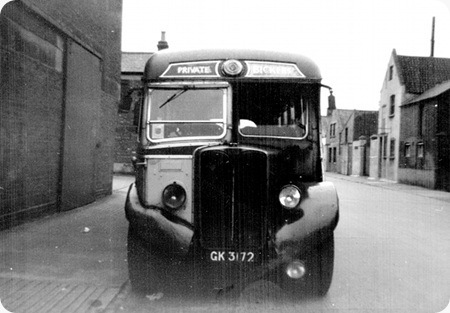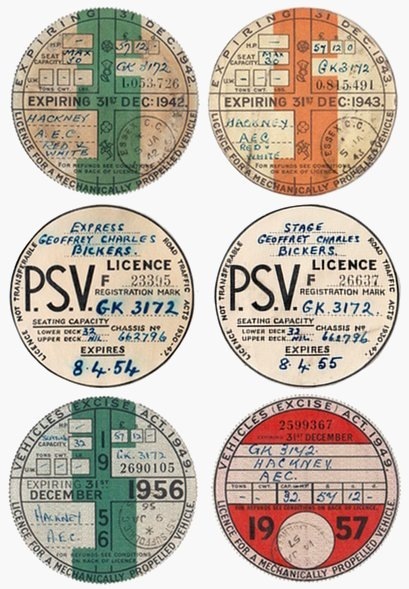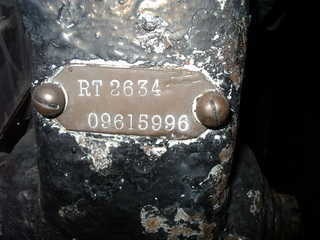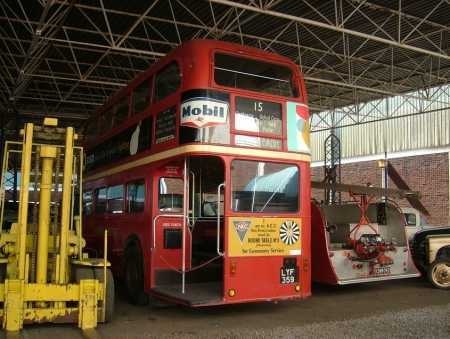Bickers of Coddenham - AEC Regal 1 - GK 3172
Bickers of Coddenham
1931
AEC Regal I
Duple C32F
Here is a pair of poor photos taken in Great Yarmouth in August 1958. As a London Transport spotter
predominantly, I was excited to note the registration GK 3172 on a cream and green AEC coach under the
Bickers title - it had to be an ex-London bus! I guessed it could be an ST, STL or T. Inspecting the
dumb-irons was the easy way for those in the know, and there was indeed the brass plate on the right
hand iron but the left hand one which would have given me the fleet number had been removed.
Later
I found that it was formerly T 300 which had been delivered in 1931 and withdrawn in 1938, bought by
Arlington Motors, Vauxhall Bridge Road, The driver told me his boss had picked the vehicle up from a
scrapyard, with that non-London Transport body already fitted - he thought, perhaps, off a Leyland.
A letter to London Transport gave me the stock number and some of these details. How kind
companies used to be to little perishers who pestered them with daft enquiries!
Sometimes I gathered redundant discs from such ‘finds’ and nowadays some folk collect them - so below are those from T300, in case any of you chaps are interested.
Photograph and Copy contributed by Victor Brumby
24/11/11 - 06:46
Gut instinct. Shape of destination indicators and circular insert. Looks a bit Plaxton to me. Would have been an early one - even off a Leyland. Would also have been rare to see a Plaxton in or from the London area.
David Oldfield
24/11/11 - 06:47
How useful those little brass plates on the dumb-irons could be - I found them
indispensable when finding old LT buses as showmen’s vehicles at funfairs!
Looking at the
indicator area above the cab, the body looks as if it could well be a Duple.
Chris Hebbron
24/11/11 - 06:48
Bearing in mind cheap labour in those far-off days, organisations as big as London Transport might well have employed a special "Clerical Officer, D.E.L.P." (Daft Enquiries from Little Perishers) to answer such esoteric questions!
Stephen Ford
24/11/11 - 06:49
Most fascinating to notice from the two PSV licences that this fine vehicle had been demoted in April 1955 from "Express" to "Stage" - so often the fate of luxury coaches whose charms had begun to wane, but to the advantage of the service bus passengers who benefitted !!
Chris Youhill
24/11/11 - 07:46
As an addendum, the excellent website, Ian’s Bus Stop, shows that the vehicle was sold to Arlington Motors in August 1938, then bought by Osborne of Tollesbury, who had it re-bodied it by Duple as C32F. It was in service with Bickers in 1954 and withdrawn in March 1959. T300’s body was transferred to T369, which suggests that only the chassis was sold by LPTB.
Chris Hebbron
25/11/11 - 06:46
Well, it was a pleasant surprise to find this operator appearing on the web
site as I am sending this note from a computer less than four miles from the Suffolk village of
Coddenham. Indeed a work colleague was brought up in Coddenham and knows various members of the
Bickers family. She has recalled that in her childhood Bickers vehicles always seemed to be older
(i.e. more interesting to us) than those of other operators.
Alfred C. Bickers (father of the
Geoffrey Charles Bickers shown on the licence) had begun running into Ipswich from Coddenham by
1925. In April 1927 he bought a new 14 seat Ford Model T bus RT 2975 which no doubt became obsolete
by the 1930s and was discarded. Many and various buses, (nearly always second hand) were bought
until 1988 when that part of the business was divided between Eastern Counties and Ipswich Buses.
Imagine everybodys surprise when about ten years ago there appeared on the Ipswich - Felixstowe
Vintage Vehicle Run a Ford Model T RT 2975 bus complete with original log book, entered and restored
by David A. Bickers of Coddenham, grandson of the original owner. In the 1960s Dave Bickers was a
well known motor cycle scramble rider and later he and his son Paul started to do stunt engineering
work for films including a number of James Bond movies, see www.bickers.co.uk Clearly the restoration of a bus would have posed little
problem to such a family of engineers.
The PSV Circle states that GK 3172 was scrapped after
withdrawal by Bickers but then that was what they said about RT 2975!
Nigel Turner
30/11/11 - 15:04
Chris Hebbron alludes to the brass dumb-iron plates to be found on all the period London buses. Above is the plate of the RT which languishes in the Johannesburg Museum of Transport, which I was amused to photograph on 2005.
Victor Brumby
16/08/13 - 12:14
Chris Youhill comments (above) about the apparent demotion of this vehicle
from Express duties to Stage.
My own memory is becoming a little hazy now, but my recollection
is that, when it came to vehicles’ PSV licences, ‘Stage’ was a higher category than
‘Express’, i.e. with a vehicle licensed as a ‘Stage Carriage’ you could do everything
you could have done with one licensed as an ‘Express Carriage’ - and more. The requirements
for a ‘Stage’ licence were stricter - e.g. a passenger/driver communication system (i.e. bell
or buzzer) had to be provided. Most vehicles were licensed as ‘Stage’, irrespective of the
sort of work they were likely to be called upon to do.
Am I remembering correctly?
David Call
18/06/15 - 10:43
I missed David Call’s comment of a couple of years ago. The classifications ‘Stage’ and ‘Express’ Carriage referred to Road Service Licences, the licences granted to operators by the Traffic Commissioners to run passenger services between specified points to a published timetable via a detailed route stopping at particular points at stated fares. The maximum size of machine for each route was also dictated. The vehicles were all licensed as psvs, and had to pass Certificate of Fitness tests at fixed intervals according to age. Thus coaches could be used legally on bus services and buses on coach services (the latter sometimes to the discomfort of passenger posteriors, no doubt). All this has changed, of course. Buses and coaches, like all vehicles of three years of age or more, now have to pass an annual MoT test, and the number of vehicles that a commercial operator can run is limited by the Operator’s Licence. The actual passenger services/routes are no longer licensed at all outside London. Bus companies today can run what they like when they like, and charge what they like for the (often dubious) privilege, subject to 42 days notice being given to the local Traffic Commissioner for applications for new or changed services.
Roger Cox
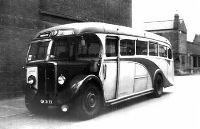 Vehicle reminder shot for this posting
Vehicle reminder shot for this posting
04/06/16 - 06:39
This is a late comment but the difference between stage and express was merely
that of the minimum fare charged.Express services had a minimum fare of one shilling and
"excursions and tours" was merely a special variety of express carriage.
I think
that vehicles used purely for private hire were licensed as "contract Carriage" but I am
not sure about that - it is a long time since I did my Institute of Transport course and by the time
I got my CPC (Operators licence) it was all irrelevant anyway.
Malcolm Hirst
Quick links to the - Comments Page - Contact Page - Home Page
Please leave a comment
Please Note if you want to send a photograph with your comment please use the Contact Page by clicking here or send as an attachment via email.

